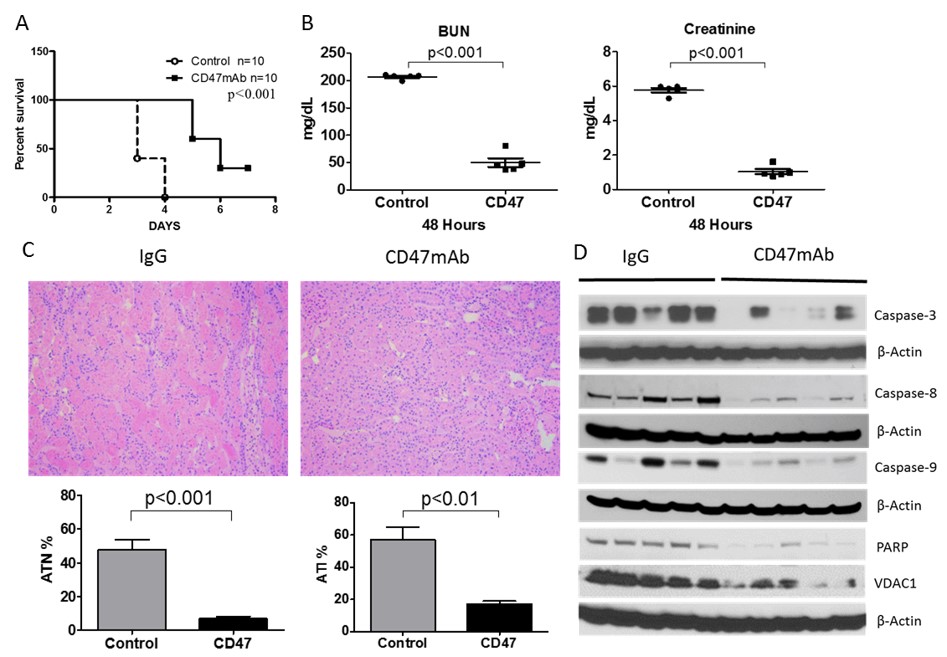CD47 Blockade Reduces Ischemia/Reperfusion Injury in Donation After Cardiac Death Rat Kidney Transplantation.
1Department of Surgery, Washington University School of Medicine, Saint Louis
2Pathology and Immunology, Washington University School of Medicine, Saint Louis
3Tioma Therapeutics, Saint Louis
Meeting: 2017 American Transplant Congress
Abstract number: 325
Keywords: Donors, Ischemia, Kidney transplantation, non-heart-beating
Session Information
Session Name: Concurrent Session: Donors with Acute Kidney Injury
Session Type: Concurrent Session
Date: Monday, May 1, 2017
Session Time: 4:30pm-6:00pm
 Presentation Time: 4:42pm-4:54pm
Presentation Time: 4:42pm-4:54pm
Location: E450a
Purpose: We evaluated the potential effects of antibody-mediated CD47 blockade to modulate vascular endothelial nitric oxide activity and reduce ischemia reperfusion injury in a rat DCD kidney transplantation model. Method: The donor organ was subjected to 1 hr of warm ischemia time after circulatory cessation then flushed with a CD47 monoclonal antibody (CD47mAb) in the treatment group (n=5), or an isotype-matched immunoglobulin in the control group (n=5). The organs were then placed in cold storage for 6 hrs and then transplanted into bilaterally nephrectomized recipients. Various factors of renal function were then evaluated, including tissue histology, markers of renal function, apoptosis, and mitochondrial stress from blood and tissue taken after 48hrs. A second set of experiments were performed using the same experimental design to assess post-transplant survival. Result: CD47mAb treatment improved survival rates after DCD renal transplantation (p<0.001). Serum markers of renal function were decreased in the CD47mAb treated group compared with control. Blood urea nitrogen levels were 50.0±7.9 vs 207.0±2.0 mg/dL (p<0.001), and serum creatinine levels were 1.0±0.1 vs 5.7 ± 0.1 (p<0.001) respectively. Histological evaluation showed that the CD47mAb treated group had significantly decreased scores of acute tubular injury (7±1% vs 48±5%, p<0.001) and acute tubular necrosis (17±2% vs 57±8%, p<0.01). Protein levels of PARP and VDAC-1 related to mitochondrial apoptosis were significantly lower in the CD47mAb treated syngeneic model (p< 0.01). Furthermore, we found the protein levels of caspase-3, caspase-8, and capase-9 were lower in the allograft tissues of the CD47mAb treated grafts (p<0.05). Conclusion: Our data show that CD47mAb blockade decreased the IRI of DCD kidneys in rat transplant models and support its use in the human setting to improve transplant outcomes.
CITATION INFORMATION: Wang X, Xu M, Jia J, Zhang Z, Gaut J, Upadhya G, Manning P, Lin Y, Chapman W. CD47 Blockade Reduces Ischemia/Reperfusion Injury in Donation After Cardiac Death Rat Kidney Transplantation. Am J Transplant. 2017;17 (suppl 3).
To cite this abstract in AMA style:
Wang X, Xu M, Jia J, Zhang Z, Gaut J, Upadhya G, Manning P, Lin Y, Chapman W. CD47 Blockade Reduces Ischemia/Reperfusion Injury in Donation After Cardiac Death Rat Kidney Transplantation. [abstract]. Am J Transplant. 2017; 17 (suppl 3). https://atcmeetingabstracts.com/abstract/cd47-blockade-reduces-ischemiareperfusion-injury-in-donation-after-cardiac-death-rat-kidney-transplantation/. Accessed February 20, 2026.« Back to 2017 American Transplant Congress
